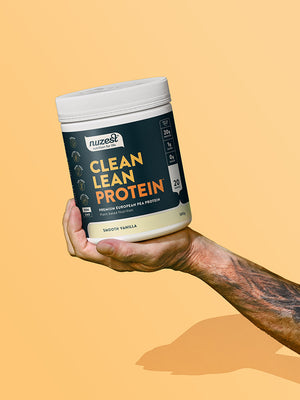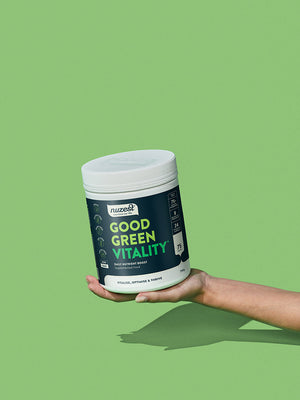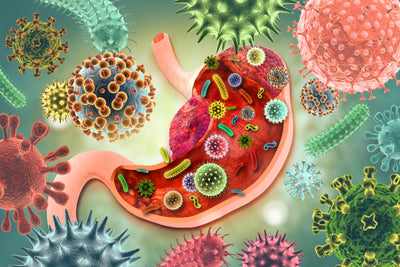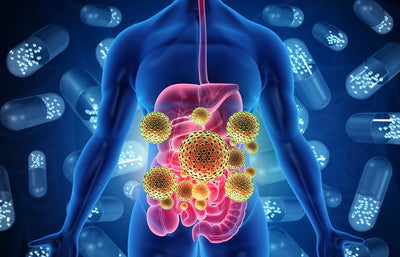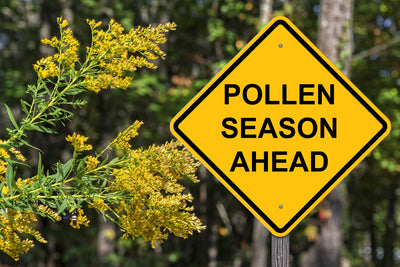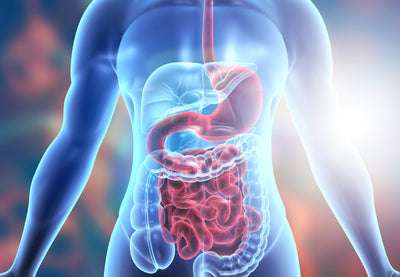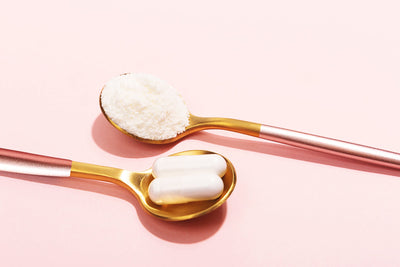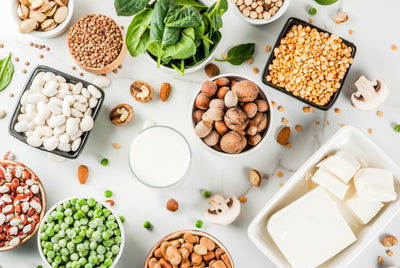
6 min read
How Inflammation Works: Endocrine Conditions
Posted By
Bold Commerce Collaborator
TITLE: How Inflammation Works: Endocrine Conditions
AUTHOR: Eleanor Good (Student Nutritionist)
The endocrine system is a series of glands that produce and secrete hormones that the body uses for a wide range of functions including metabolism, reproduction, growth and movement1. The hormones produced by our glands are sent into the blood stream and are delivered to various tissues in the body to tell them what they are supposed to do. However, when these glands do not produce the right amount of hormones, diseases can develop.
Read on to learn more about some common endocrine conditions and the nutrients that are considered important for various aspects of our health.
The role of inflammation in obesity
Obesity is, by definition, a condition that occurs as the result of abnormal or excessive fat accumulation in the body2. This fat is referred to as ‘adipose tissue’, and it is the most widely recognised feature of obesity. Up until recently, adipose tissue has been thought of as passive tissue responsible only for energy storage. However, it is now considered an additional organ of the endocrine system that is actively involved in the regulation of inflammation[1].
It is thought that excess macronutrient consumption stimulates the production and release of proinflammatory molecules and hormones. This, in conjunction with other pro-inflammatory states common in people with obesity (e.g. insulin resistance, high blood pressure) contributes to systemic inflammation, however how exactly obesity triggers chronic low-grade inflammation is still the focus of wide research3-6.
The role of inflammation in polycystic ovary syndrome
Polycystic Ovary Syndrome (PCOS) is a hormonal disorder common among women of reproductive age. Women with PCOS commonly have high levels of insulin that don’t work effectively, and/or male hormones known as 'androgens’. When the body’s normal response to insulin is impaired, a person is said to display ‘insulin resistance’ – a condition that is present in up to four out of five women with PCOS.
The cause of PCOS is not fully understood, however family history and genetics, hormones and lifestyle play a role7. Chronic low-grade inflammation has also emerged as a key contributor to the development of PCOS, with markers of inflammation being highly correlated with circulating androgens and insulin resistance8.
Can what we eat effect these endocrine conditions?
Lifestyle modification such as increasing physical activity and eating a healthy diet is integral to the management of both obesity and PCOS. Interestingly, research indicated that people who have PCOS and are obese can experience significant health improvements with as little as a 5-10% loss in body weight9. Accordingly, a diet that is rich in protein (the most satiating macronutrient) and fibre from foods such as fruits, vegetables, wholegrains carbohydrates, legumes, beans, nuts and seeds will help with weight management and thus, the long term management of both of these conditions.
The role of inflammation in Cushing’s disease
Cushing’s disease is a condition in which the pituitary gland releases too much adrenocorticotropic hormone (ACTH), stimulating the secretion of cortisol – the body’s main stress hormone. It is thought that long term exposure to heightened cortisol levels may lead to an altered adipose structure increasing systemic inflammation, which may be behind the development of insulin resistance, obesity, and cardiovascular disease which are commonly associated with this condition10.
As Cushing’s disease affects weight and cardiovascular outcomes (e.g. high cholesterol), it may be useful to swap foods that are highly refined, processed and high in saturated and trans fats for foods that contain heart healthy omega-3 fats and are fibre-rich, such as those mentioned above.
The information provided in this article is intended for educational purposes only and is general advice. It should not, nor is it intended to be, relied on as a substitute for individual medical advice or care. If the contents of this, or any other of the blogs in this series raises any concerns or questions regarding your health, please consult a qualified healthcare practitioner.
References
- https://www.hormone.org/what-is-endocrinology/the-endocrine-system
- https://www.who.int/topics/obesity/en/
- Lee, H., Lee, I. S., & Choue, R. (2013). Obesity, inflammation and diet. Pediatric gastroenterology, hepatology & nutrition, 16(3), 143–152. https://doi.org/10.5223/pghn.2013.16.3.143
- Ellulu, M. S., Patimah, I., Khaza'ai, H., Rahmat, A., & Abed, Y. (2017). Obesity and inflammation: the linking mechanism and the complications. Archives of medical science : AMS, 13(4), 851–863. https://doi.org/10.5114/aoms.2016.58928
- Ellulu, M. S., Patimah, I., Khaza'ai, H., Rahmat, A., & Abed, Y. (2017). Obesity and inflammation: the linking mechanism and the complications. Archives of medical science : AMS, 13(4), 851–863. https://doi.org/10.5114/aoms.2016.58928
- Hajer, G. R., van Haeften, T. W. & Visseren, F. L. (2008). Eur Heart J, 29(24), 2959-71
- https://www.betterhealth.vic.gov.au/health/conditionsandtreatments/polycystic-ovarian-syndrome-pcos
- https://www.ncbi.nlm.nih.gov/pmc/articles/PMC3309040/
- https://www.betterhealth.vic.gov.au/health/conditionsandtreatments/polycystic-ovarian-syndrome-pcos
- https://www.endocrineweb.com/professional/cushings/adiposity-may-act-reservoir-pro-inflammatory-activity-cushings-disease
[1] Lee, H., Lee, I. S., & Choue, R. (2013). Obesity, inflammation and diet. Pediatric gastroenterology, hepatology & nutrition, 16(3), 143–152. https://doi.org/10.5223/pghn.2013.16.3.143
Related news
min read
An Introduction to Gut Health & Nutrition – 5 Must See Articles
Gut health significantly affects overall wellbeing, influencing brain function, immunity, and metabolism. A balanced gut microbiota, influenced by diet and environment, can potentially enhance health, aid digestion, and reduce allergies. The roles of probiotics and prebiotics in gut health are also discussed.
min read
Probiotics vs. Prebiotics
Unleash gut health with probiotics and prebiotics! Strengthen digestion, immunity, and overall well-being. Try Nuzest's Good Green Vitality for convenient support with 8 billion CFU of probiotics. Take charge now!
min read
The Link Between Gut Health & Allergies - Plus 5 Top Tips to Help
Discover the link between gut health and allergies, and how the gut microbiome influences the body's immune response to allergens. Learn how adopting a balanced diet with prebiotics and probiotics can support gut health, reducing the risk of allergic reactions. Explore solutions for allergy relief and fostering a healthier gut with Nuzest’s multi-nutrient formula, Good Green Vitality.
min read
The Great Diet Debate: Unravelling the Tapestry of Popular Eating Plans
Exploring popular diets such as the Mediterranean, Ketogenic, Plant-Based, Paleo, and Intermittent Fasting, this overview highlights their principles, benefits, and considerations. It emphasizes the importance of finding a dietary pattern that aligns with individual health goals and preferences, while suggesting the potential benefits of incorporating a multi-nutrient supplement for overall health.
min read
The Gut Connection: How to Improve Your Digestion and Gut Health in 6 Steps
Discover the significance of gut health and its impact on digestion and overall well-being in this insightful article. Learn six practical steps, including maintaining a balanced diet, staying hydrated, managing stress, and using antibiotics wisely, to promote a healthy gut and enhance vitality.
min read
Does Gut Health Affect Your Immune System? | Do These 6 Things
The gut microbiome, which consists of trillions of bacteria in our digestive tract, plays a crucial role in supporting our immune system and overall health. Consuming probiotics and prebiotics, staying hydrated, managing stress, limiting processed foods, and engaging in outdoor activity and exercise are effective strategies to promote a healthy gut and enhance immunity.
min read
What is Collagen? Types, Sources and Benefits of Supplementation
Collagen is essential for joints, bones, muscles, ligaments, tendons, cartilage, skin, hair and nails.2 It is one of the primary structural proteins of connective tissue and plays a crucial role in the body by cushioning, strengthening, hydrating, binding, and connecting tissues together.3 Connective tissues are able to provide physical and mechanical support through the collagen, elastic and reticular fibres
min read
Kids Good Stuff for Skin Health
How can you ensure your kids have healthy skin? A part from the obvious, what nutrients can we provide our kids to ensure their skin stays in tip top shape?
min read
Maximising Mood In Your Kids
Almost 1 in 7 children and adults aged 4-17 had been diagnosed with a mental health disorder. Amy Butler discusses good nutrition and lifestyle modifications, that can help to reduce the risk.
min read
Long-Lasting Energy For Kids
Children and adolescents are going through massive periods of growth and development. To keep up with the demands of school, extracurricular activities, sports and friendships, kids often need a bit of an energy boost. In our latest blog we break down some specific nutrients for energy, to help support growing kids, and the best places to source them from.
min read
Setting Health Goals & Staying Motivated in 2021
Use this tried and tested goal strategy to set smaller, specific goals to avoid the overwhelm of unrealistic and vague health objectives.







